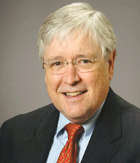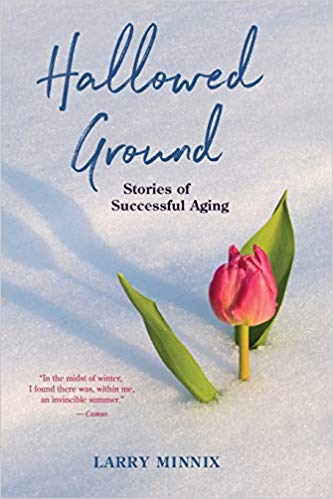
Retired LeadingAge President and CEO Larry Minnix has published his first book, an inspirational self-help volume for people of all walks of life, “Hallowed Ground: Stories of Successful Aging.”
Drawing from personal and professional experiences, Minnix delivers observations and advice honed from more than four decades in the aging services field. A native Georgian with a divinity degree, his sharp sense of humor and unique candor spare nobody from scrutiny and judgment, least of all himself and his family.
Reprinted here, with permission of the author, is the first chapter of “Hallowed Ground,” titled “The Twelve Secrets,” and subtitled “ … to shrivel or expand …”
Chapter 1
“As I traveled around the country meeting older people, their family members, and staff who cared for them, I often wondered what makes the difference in how a person grows old. Why does one person shrivel in their soul as they shrivel in their body while another expands spiritually even as their body shrinks?
Emblazoned in my memory is the Reverend Roy McTier at age 101, praising God at the top of his feeble lungs encased in his remaining bony body as he lay dying in a state-of-the-art hospital at Emory. I walked in on him as he seemed to be shrieking in pain. Instead, he was praising God. Where does that zest for life and the adoration for the eternal Giver of it come from?

Based on my observations, I have concluded that there are twelve secrets of successful aging embodied in people like Roy. The stories that follow illustrate these twelve secrets in subsequent chapters. There is some research scattered throughout the professional literature to support these secrets. Perhaps the best summary of that research is in the book Successful Aging by the eminent Dr. John Rowe. I recommend it to you.
- CHOOSE YOUR ANCESTORS WISELY — AND GET TO KNOW THEM. Beyond genetics, understand your family history and dynamics. Crazy Aunt Lucy who no one talks about may have had an untreated bipolar disorder that runs in your family. My own family had alcoholics, gamblers, and abusers. That fact has informed what I have told my children about addiction. Understanding your genes and your family history can help future generations keep out of serous trouble, as well as help you understand your own body and mind.
- MANAGE YOUR LIFESTYLE. This is hard for me because I have always struggled with my weight, though usually not hard enough. My mother used to reassure me I just had big bones, but I know I have a big appetite, one often triggered by stress. Successful aging is associated with choices about food, habits, activities, the management of anger, healthy relationships, and the management of the health challenges that inevitably arise because of genetic flaws and accidents.
- CULTIVATE AN ATTITUDE OF PERSEVERANCE. Successful aging reflects successful living. Aging begins at conception and ends at death. It includes predictable cycles, each with its own opportunities and challenges, losses and gains, successes and failures. Even the challenges can produce wisdom. Don’t ask, “Why me?” Ask, “What can I learn from this? What can I teach?” Resist the stereotypical view of aging as peaking at forty, then declining until death, augmented by Botox, implants, chemicals, and trophy partners. There is no fountain of youth, but there are successful strategies for fulfillment as we age. There are three basic old-age personas from which to choose: Victim, as characterized by disease, decline, and dependence; Denier, as characterized by artificial trappings and avoidance; and Perseverance, characterized by acceptance of aging and the adaptations needed to make the most of it. Yes, there are genuine victims among us: truly helpless people. We have a moral duty to them. But deniers create difficulty for us because they choose to succumb to their pride and stubbornness. Perseverance is the third choice, based on attitude. Roy Persevered.
- AVOID GIVING ORGAN RECITALS. Don’t talk about your innards and whether or not they are working properly. People do not enjoy your “organ recitals,” as my dear friend Harold called them. They create self-fulfilling prophesies, decreased self-confidence, and social isolation. You are not an accumulation of your diseases. Yes, it is important to keep your loved ones informed about your health. Just don’t talk about it all the time! Don’t become your diseases. You are not an arthritic or a bipolar. You are a person who happens to have been dealt that hand.
- CULTIVATE INTIMACY. Intimate encounters occur in the confession booth, around the dinner table, traveling to and from school with the grandkids, and in the bedroom. It happens through massage, hugs, sharing secrets, bedside visitation in the nursing home, Bible study groups, and orgasm. Don’t let growing older confine you inside a dismal bubble. If your spouse has died, use bereavement as an opportunity to learn from your previous marriage to make the next one better or to just be grateful for the life you led together. But don’t isolate yourself. My wife, Kathleen, has often said that if she predeceases me, she is confident that I will have one eye open, scanning the assembled crowd, looking for rich widows to replace her at the final graveside prayer. She’s said she hopes I’d remarry.
- LAUGH AND PLAY. I believe that inside every eighty-five-year-old is the remnant of a delightfully immature youngster. Find the humor in life — especially in the most difficult situations. Belly laughs create cathartic body chemistry. The creative arts, naughty stories, parlor games, trips, and lifelong learning are mediums for play and laughter. Laughter and play remind us that we are still alive, not merely waiting to die. As Camus said, “In the midst of winter, I found that there was within me, an invincible summer.”
- AVOID POISONOUS PEOPLE. Some people are turds in life’s punchbowl. Some are even evil. Some are just downers. Some make you a lightning rod for their hostility. Others are leeches. Some are carriers of stress, and stress is as contagious as the flu virus. Some are abusers. You may be tempted to change them, but that’s nearly impossible. The most difficult to avoid are “high voltage” people: you can’t hold on and you can’t let go. Break the current and move on. A cartoon sent from my late mother said: “Never try to teach a pig to sing. It wastes your time and it annoys the pig.” Stay away from poisonous people. You are not responsible for them. Some family members are poisonous, so especially avoid them.
- RENEW AND REENGAGE INSTEAD OF RETIRE. There comes a time for most of us when our job becomes tiresome or when we are less competent to do it. Get out at the top of your game. There is nothing more pathetic in the workplace than someone who stays too long. So get out. Then, take time to recover from the grind of it. When you have, renew your commitment to something worthwhile, a new career or a cause or public service, an avocation, more time with the grandkids, reflection and meditation, reading the great books, developing a vibrant prayer life, rekindling an important relationship. Ask yourself, in fifteen years, what will I not be able to do? Make your bucket list, and then start crossing off those items. Remember that you will likely spend an extended time as a caregiver or care receiver. That may be a full-time job. So, prepare yourself for that eventuality and know where you can find help> Before then, share your life wholly with the ones you love, ones who have often had to settle for a fraction of your time and attention.
- PLAN FOR ONE HUNDRED YEARS AND LIVE LIKE THERE’S NO TOMORROW. Howard Busby, a friend and Wesley Woods board member, is a financial-planning guru who introduced us to the magic of compound interest! Contrary to popular mythology, the government doesn’t assure your lifestyle in retirement. Significant amounts of personal expense will likely be incurred for short- and long-term healthcare needs. Start saving money early and regularly. Get your legal house in order. IT should be clear in writing who is authorized to make health decisions and manage your money in the event that you cannot. Discuss these decisions with family, a doctor, a lawyer, and a close friend or two. And get rid of as much stuff as you can except family history. As I heard a man say once, “You ain’t never seen a U-Haul behind a hearse.” Live like there’s no tomorrow because one day there won’t be. And don’t leave your family with uncertainty or mess.
- KEEP THE FAITH. People who maintain a religious life age more successfully than those who don’t. Like our physical, emotional, and social dimensions of life, the spiritual dimension changes as well. Learn to pray differently, more deeply, and more often. Prayer is the most and the least we can do for ourselves and anyone else. Meditation and reflective techniques can add deeper meaning to life. Worship, sharing life’s struggles with kindred spirits, study, and service to others enhances health and engagement. Confession and reflections help with the ultimate conclusion as to whether or not life has been worthwhile.
- GRIEVE WITHOUT REGRET. Many family members have told me one way or another, “When Mother dies, I want to look myself in the mirror and know I’ve done the best I could by her in the last years.” Or, simply put, “No regrets.” Grief without regret is cleansing. Regret carries the sicknesses that produces guilt and blame for many years and multiple generations. Woulda, coulda, shoulda can be deadly, while grieving the loss of someone we love can be freeing.
- SAY GOOD-BYE. There comes a time for all of us to die. The issue for many is whether we say good-bye or avoid it, whether we ask forgiveness from those we have wronged or die with them resenting us for the rest of their own lives while there is still time to repair relationships. A disease like cancer gives us an immediate excuse to review our life, tell folks how much we love and appreciate them, get our affairs in order. A fatal heart attack doesn’t. Dementia often doesn’t because of the loss of memory and judgment. So, make every encounter a good-bye of sorts, and you will help yourself, your family, and your friends rest in peace. And at every gathering, share stories!
So, welcome to my Hallowed Ground stories. If you read this and at some future place, time, or situation you think of one of these stories, then this book has left its mark. Just as your story shared will do so for others. And remember, embedded in them are the secrets of successful aging.”
Larry Minnix is unveiling “Hallowed Ground: Stories of Successful Aging” at the LeadingAge annual meeting through Wednesday at the Pennsylvania Convention Center in Philadelphia. It is also already available for purchase through online booksellers and can be bought through his own website..




